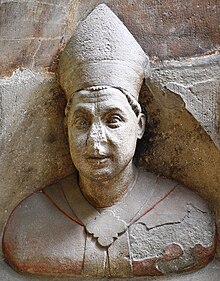You can help expand this article with text translated from the corresponding article in Czech. (October 2023) Click [show] for important translation instructions.
|
Jan z Jenštejna[n 1] (1348 – 17 June 1400) was a Bohemian archbishop, composer and poet.[1] From 1379 to 1396 he was the Archbishop of Prague. He studied in Bologna, Padova, Montpellier and Paris.
Jan z Jenštejna | |
|---|---|
 Bust (sculpture) of Jan of Jenštejn in the St. Vitus Cathedral in Prague | |
| Born | 1348 Prague |
| Died | 17 June 1400 |
| Occupation(s) | Archbishop, composer, poet. |
| Notable work | Rebuilding castle Jenštejn |
Life and career
editBorn in 1348 in Prague,[1] he became the owner of the castle Hrádek in 1379. The same year he succeeded to the archbishopric of his uncle Jan Očko z Vlašimi who had stepped down. Soon he became Chancellor to Wenceslaus IV of Bohemia. The next year the capital was struck by a Plague epidemic, which struck him as well. He recovered, but this episode left deep scars on his character and he began to examine theological and philosophical problems at his castle Helfenburk u Úštěka. He had abandoned public life because of a quarrel with Wenceslav IV, which was mainly over the matter of the Popes of Avignon. Jan was still loyal to Pope Urban VI, to whom the king was not. In 1384 he left his chancellor post. The quarrel with the king removed him completely from political life, and he retired to his castle and abandoned the post of archbishop on 2 July 1396. He was succeeded as archbishop by Olbram ze Škvorce.[2]
While on his castle, he fell from a newly built tower and miraculously managed to grab hold of something before falling to the ground.
He died in Rome on 17 June 1400,[1] and all his possessions, including his castle, passed to the Archbishops of Prague.
Artistic works
editIt can be said that his artistic action is as extensive as his political and religious activities. He organized the costly rebuilding of several castles, especially Jenštejn..
His musical works were compiled in the book Die Hymnen Johanns von Jenstein, Erzbischofs von Prag of Q. M. Dreves.[1] The book was published in German in 1886.[1] His literary activity was very rich and includes not only religious and philosophical works, but also poems.
He influenced literature and music with his own work. His musical activity was not systematic, but rather random. Before 1380 it was often dance music, then religious music.
References
editNotes
editCitations
edit- ^ a b c d e Vlhová-Wörner 2018.
- ^ "Jan of Jenstejn - Prague Minos Guide". www.digital-guide.cz. Retrieved 27 July 2024.
Sources
edit- Vlhová-Wörner, Hana (2018). "Jan z Jenštejna". Grove Music Online. Oxford: Oxford University Press. doi:10.1093/omo/9781561592630.013.3000000143. ISBN 9781561592630. (subscription or UK public library membership required)
Further reading
edit- Boehm, Barbara Drake; Fajt, Jiri (2005). Prague: The Crown of Bohemia, 1347-1437. New York: The Metropolitan Museum of Art. ISBN 1588391612.
- Weltsch, Ruben Ernest (1968) Archbishop John of Jenstein (1348–1400): papalism, humanism and reform in pre-Hussite Prague Mouton, The Hague, OCLC 963607
- Wratislaw, Albert Henry (1878) "John of Jenstein, archbishop of Prague, 1378-1397" Transactions of the Royal Historical Society 7: pp. 30–57
- Kopecký, Milan (1999) Jan Milíč z Kroměříže a Jan z Jenštejna Cisterciana Sarensis, Žďár nad Sázavou, OCLC 44149277 Archived 29 September 2007 at the Wayback Machine, in Czech
- Bitnar, Vilém (1938) Jan z Jenštejna: Mariánský a eucharistický horlitel české gotiky Vítězové, profesoři bohosloveckého učiliště řádu dominikánského, Olomouc, OCLC 85601162 in Czech
- Holinka, Rudolf (1933) Církevní politika arcibiskupa Jana z Jenštejna za pontifikátu Urbana VI: Studie z dĕjin velikého schismatu zapadního University Komenskeho, Bratislava, OCLC 19047598 in Czech